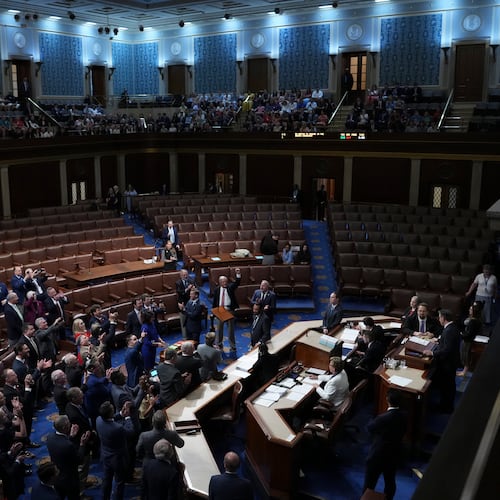WASHINGTON — How this week was supposed to end: “Republicans know what they’re doing for health reform!”
How it really ended: “Republicans know what they’re doing for health reform?”
Like the House before it, the Senate had to pause its efforts to scrap Obamacare. Most everything remains on the table. There was the Senate bill, panned by one observer not as Obamacare 2.0 but as Obamacare 1.1 — just a service patch. There was President Donald Trump’s sudden support Friday for a vote now on a clean repeal (to take effect in no less than two years) followed by a longer debate over a replacement. And there was the possibility of no agreement.
Underlying all these options is an open secret: However this shakes out, at least a couple of elements of Obamacare are here to stay. One is the ban on insurers denying coverage to consumers because of pre-existing conditions. Another is the provision allowing people to keep their adult children on their plans until age 26.
These items don’t necessarily make for a healthier insurance market. Doesn’t matter. Constituents have expressed clearly a desire to keep them, even as Congress jettisons other parts of the law.
Rep. Barry Loudermilk of Georgia puts it this way: When you pour concrete, it quickly begins to set. You can prevent or slow its setting by agitating it, but only those parts you keep moving. Anything else will harden and require a jackhammer to break up.
In this way Obamacare, despite its long record of unpopularity, has altered Americans’ views about health care, and the government’s role in it. So the most interesting question in this debate right now is: What could Republicans do that would have an equally lasting effect?
Having spoken with several Republicans in Georgia’s delegation this week, I’ll offer a couple of suggestions.
First is reintroducing market forces into the individual insurance market. Obamacare sought to establish markets (i.e., the exchanges) while strangling market forces through over-regulation. The result has been a series of predictable failures that threaten to send the exchanges into a death spiral.
Insurers need the latitude to create varied products for consumers and then compete for their business. Obamacare didn’t allow that. The GOP bill needs to re-establish in Americans’ minds the benefits of a freer and more competitive insurance marketplace.
Second is revamping Medicaid, giving states more flexibility to run their programs and restoring it as a safety-net program for the aged, blind and disabled, plus poor pregnant women and children, and not a way to insure the working poor.
The latter point is key: Obamacare’s Medicaid expansion had the perverse effect of devoting more federal dollars to the able-bodied than the people the program was meant for. That’s not to say the working poor shouldn’t get help, just that Medicaid isn’t the right way to provide it. The GOP bill needs to help Americans view Medicaid as a true safety net, not a vehicle for moving ever more people into government dependence.
No bill will be the end-all, be-all of health reform. But Republicans can and must ensure their effort, whatever shape it eventually takes, has an even more durable effect than Obamacare did.
About the Author
Keep Reading
The Latest
Featured


